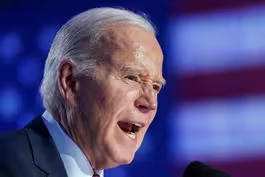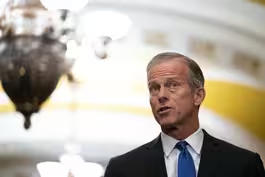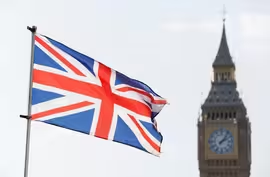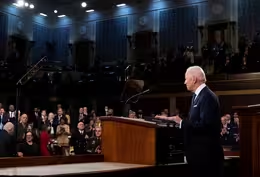
Tribal communities face challenges accessing the internet
Clip: 3/7/2024 | 3m 52sVideo has Closed Captions
Tribal communities face challenges accessing the internet
For many tribal communities in America, internet access isn't always as easy as logging on to a computer. The FCC reports almost 28 percent of tribal land residents lack high-speed broadband, compared to 1.5 percent of urban residents. But the Biden administration is offering funds to try and change that. Cronkite News reporter Maria Staubs reports on how better connectivity may not be enough.
Problems playing video? | Closed Captioning Feedback
Problems playing video? | Closed Captioning Feedback
Major corporate funding for the PBS News Hour is provided by BDO, BNSF, Consumer Cellular, American Cruise Lines, and Raymond James. Funding for the PBS NewsHour Weekend is provided by...

Tribal communities face challenges accessing the internet
Clip: 3/7/2024 | 3m 52sVideo has Closed Captions
For many tribal communities in America, internet access isn't always as easy as logging on to a computer. The FCC reports almost 28 percent of tribal land residents lack high-speed broadband, compared to 1.5 percent of urban residents. But the Biden administration is offering funds to try and change that. Cronkite News reporter Maria Staubs reports on how better connectivity may not be enough.
Problems playing video? | Closed Captioning Feedback
How to Watch PBS News Hour
PBS News Hour is available to stream on pbs.org and the free PBS App, available on iPhone, Apple TV, Android TV, Android smartphones, Amazon Fire TV, Amazon Fire Tablet, Roku, Samsung Smart TV, and Vizio.
Providing Support for PBS.org
Learn Moreabout PBS online sponsorshipAMNA NAWAZ: For many tribal communities in America, Internet access isn't always as easy as logging on to a computer.
The FCC reports, almost 28 percent of tribal land residents lack high-speed broadband, compared to 1.5 percent of urban residents.
The Biden administration is offering funds to change that.
But as student reporter Maria Staubs from Arizona State University's Cronkite School of Journalism tells us, better connectivity may not be enough.
MARIA STAUBS: This construction project on the Tohono O'odham Nation is bringing the 21st century to a rural part of Arizona.
TONYA JOAQUIN, Vaya Chin Resident: Here on the reservation, our connection with the Internet is kind of sparse, so it's here or there.
MARIA STAUBS: The Tohono O'odham Utility Authority is laying down a fiber optic network to provide high-speed Internet to members of the nation.
It's thanks to a $10 million grant from the Department of Agriculture.
TONYA JOAQUIN: We are moving more towards the technology era, and we don't want to get left behind.
MARIA STAUBS: Vaya Chin resident Tonya Joaquin says the high-speed Internet will improve her family's education and health care.
TONYA JOAQUIN: We live about, what, two hours, 2.5 hours away from town.
My son will have telemed.
So, he sees a doctor out at the Phoenix Children's Hospital.
We don't have to drive there.
We have a home visit on the Internet.
KRISTAN JOHNSON, Tohono O'odham Utility Authority: We're able to educate and teach our tribal membership of all ages.
MARIA STAUBS: Kristan Johnson manages operations for the tribe's main Internet service provider.
She says broadband will provide opportunities for economic development.
KRISTAN JOHNSON: Whether they're basket weavers, they are dressmakers, they harvest, or whatever they do, they're able to put that on the Internet and be able to sell it and be -- help themselves out.
MARIA STAUBS: While members of the nation have welcomed the investment in broadband infrastructure, there are fundamental barriers that prevent its full implementation in Native American communities, high on the list, access to a computer or a smartphone at home and an understanding of how to use them.
BRIAN FICKETT, General Manager, Tohono O'odham Utility Authority: We have elders that they don't even know what Internet is.
MARIA STAUBS: Brian Fickett is the general manager of the agency that provides Internet and cell service to the tribe.
BRIAN FICKETT: These folks will be able to connect at home, just like they would off the reservation.
MARIA STAUBS: Here at the Tohono O'odham Community College, a computer literacy training program provides 10 members from each district with education on how to use the Internet.
MAN: Your subject line right here.
MARIA STAUBS: Lessons can be as simple as sending an e-mail.
Anselmo Ramon is one of the leaders of the program.
ANSELMO RAMON, Tohono O'odham Community College: We train them from the very basics of the components, move them up to the features on the keyboard, move them up to turning it, like, on and off.
MARIA STAUBS: There are students of all ages here.
Some are familiar with the technology.
JUANITA HOMER, Student: It's been over five years since I used a computer.
So, this is really helping me to learn more.
MARIA STAUBS: Others are starting fresh.
FRANCINE JOSE, Student: It's really new to me.
Everything's new to me.
I have never been on the computers.
MARIA STAUBS: Funding for the computer training course lasts only two years, so Anselmo Ramon has devised a plan to grow computer literacy throughout his tribal nation.
It relies on students passing on their newfound knowledge.
ANSELMO RAMON: So, in train the trainer, we want to train 10 people.
In turn, we want those people to train another family member or a friend or a co-worker.
MARIA STAUBS: It's a practical solution because tribal members understand, before they can run with high-speed Internet, they have to first learn how to walk.
For the "PBS NewsHour," I'm Maria Staubs with Cronkite News on the Tohono O'odham tribal lands.
How a cyberattack crippled the U.S. health care system
Video has Closed Captions
Clip: 3/7/2024 | 6m 47s | How a cyberattack crippled the U.S. health care system (6m 47s)
News Wrap: Biden closes in on presidential nomination
Video has Closed Captions
Clip: 3/7/2024 | 4m 17s | News Wrap: Biden closes in on Democratic presidential nomination (4m 17s)
Sen. John Thune on the 2024 race, GOP leadership and Ukraine
Video has Closed Captions
Clip: 3/7/2024 | 8m 15s | Sen. John Thune on the 2024 race, GOP leadership and funding for Ukraine (8m 15s)
‘The Internationalists’ probes Biden foreign policy approach
Video has Closed Captions
Clip: 3/7/2024 | 7m 2s | ‘The Internationalists’ explores Biden's foreign policy approach after Trump (7m 2s)
UK proposal would crack down on extremism over war in Gaza
Video has Closed Captions
Clip: 3/7/2024 | 6m 36s | UK proposal would crack down on extremism over war in Gaza (6m 36s)
What to expect from Biden's third State of the Union address
Video has Closed Captions
Clip: 3/7/2024 | 7m 27s | What to expect from Biden's third State of the Union address (7m 27s)
Providing Support for PBS.org
Learn Moreabout PBS online sponsorship
- News and Public Affairs

FRONTLINE is investigative journalism that questions, explains and changes our world.

- News and Public Affairs

Amanpour and Company features conversations with leaders and decision makers.












Support for PBS provided by:
Major corporate funding for the PBS News Hour is provided by BDO, BNSF, Consumer Cellular, American Cruise Lines, and Raymond James. Funding for the PBS NewsHour Weekend is provided by...





